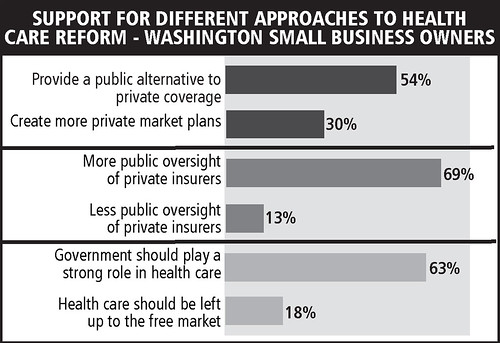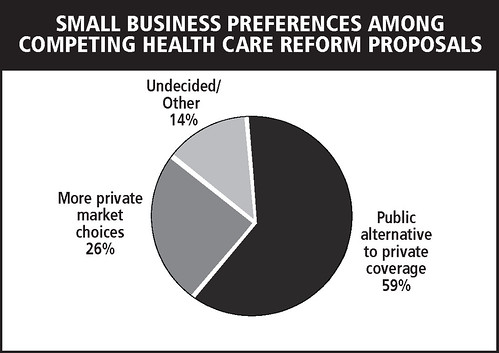 While health care reform legislation has already cleared one major hurdle by passing a narrow vote of 220-215 in the House of Representatives, (which also included this from the apparently "liberal" Democratic Party), it still faces the daunting task of making its way through the Senate. While the dominant story or angle reported on regarding the legislation has focussed almost exclusively on whether or not it will pass, what hasn't really been scrutinized is the legislation itself (albeit of course the ludicrious accusations and screams of "socialism" and "Nazi Germany" from the teabagging Glenn Beck army of buffoons).
While health care reform legislation has already cleared one major hurdle by passing a narrow vote of 220-215 in the House of Representatives, (which also included this from the apparently "liberal" Democratic Party), it still faces the daunting task of making its way through the Senate. While the dominant story or angle reported on regarding the legislation has focussed almost exclusively on whether or not it will pass, what hasn't really been scrutinized is the legislation itself (albeit of course the ludicrious accusations and screams of "socialism" and "Nazi Germany" from the teabagging Glenn Beck army of buffoons).Marcia Angell, a senior lecturer at Harvard Medical School, recently outlined her case against the current legislation, its flaws and weaknesses. She argues that the legislation solidifies and subsidizes the "takeover" of health care by the insurance industry, which initially transpired when the Clinton reform effort failed in 1994. Angell does stress that the legislation has some good components, such as the expansion of Medicaid, and the bill also provides some regulation (finally!) of the industry, including outlawing the denial of insurance due to "pre-existing conditions. However any substantial change is really minimal, as premiums will not be regulated, so private health insurance firms may very well continue to raise their rates. The legislation does do much to combat the outrageous enticements which lead doctors to over-treat those who are more than adequately insured. In fact, Angell points out that the legislation is so confusing and complicated that it would take a daunting operation to direct it and enforce its regulations. And we know how well regulations do in America, and how long they'll last before they're scapegoated and demonized.
The health insurance industry meanwhile would get tens of millions of new customers, due to the bill's mandate and the taxpayer's financial support. The industry's newest clients would be the youngest, healthiest clients, specifically those who are least likely to have to immediately rely on their insurance. The legislation allows private insurance companies to charge twice as much for older Americans as for younger ones. So for instance, older Americans under the age of sixty-five will be more susceptible to being without insurance, even though they may have to pay fines. But that's acceptable for the insurance industry, considering that these people would be included with their most dire clients.
 The public option meanwhile is not an "option" at all, Angell maintains, but rather a government program intended to cover only six million uninsured Americans. The public option was supposed to provide stark competition for the private insurance industry, but instead is there for those who cannot afford private health insurance in the first place (along with millions more).
The public option meanwhile is not an "option" at all, Angell maintains, but rather a government program intended to cover only six million uninsured Americans. The public option was supposed to provide stark competition for the private insurance industry, but instead is there for those who cannot afford private health insurance in the first place (along with millions more).Angell believes that if the legislation passes the Senate, health costs will continue to explode, more so than ever before as taxpayer money will be shuffled into the private sector. She believes that the government and employers will decrease benefits while boosting deductibles and co-payments. More Americans will have insurance in the long run, but it will be much more expensive and gradually cover fewer.
Angell counters the findings of the Congressional Budget Office, which determined that the House of Representative's legislation will essentially be budget-neutral over the next decade. She states that could very well transpire, but takes argument with the CBO and that their findings were really just assumptions: that the CBO is not preoccupied with total health costs, but rather only with costs to the government.
In addition, the House of Representative's legislation would remove funds from Medicare, and move them to the private sector and to Medicaid (to a lesser degree). Taxes on the wealthy would cover the remainder of the costs. So, even though the legislation might pay for itself, it does nothing to resolve the dilemma of skyrocketing inflation in the system. Money is being moved from one part of a broken system to another.
 Rose Ann DeMoro, the Executive Director of the California Nurses Association and the National Nurses Organizing Committee, issued a statement which was very similar in tone and context to Angell's. DeMoro pointed out both the positives and negatives of the legislation, with the positives including:
Rose Ann DeMoro, the Executive Director of the California Nurses Association and the National Nurses Organizing Committee, issued a statement which was very similar in tone and context to Angell's. DeMoro pointed out both the positives and negatives of the legislation, with the positives including:• Expansion of Medicaid to millions of low income adults.
• Reduction of the "doughnut hole" in the Medicare drug coverage law making drug costs more affordable for many seniors.
• Increased federal funding for community health programs, such as home visits for nurses and social workers to low income families.
• Additional regulation of the insurance industry, mostly targeted to people who are presently without coverage rather than those with existing health plans. Those include limits on insurers ability to drop sick enrollees or refuse to sell policies to people with prior health problems, extending the age that dependent children can be on their parents' plan, and repeal of the anti-trust exemption for insurers.
• Extending the same health benefit tax benefits available to married couples to domestic partners.
• A progressive tax to help pay the bill through a surcharge on wealthy earners and required contributions from large employers, in sharp contrast with the Senate proposal to tax health benefits on misnamed "Cadillac" plans, comprehensive coverage available to many union members, for example.
And the negatives:
• Healthcare will remain unaffordable for many Americans. The bill does not do nearly enough to control skyrocketing insurance, pharmaceutical, and hospital costs. Indeed, by various estimates, with no effective limits on the insurance industry's price gouging, out-of-pocket costs for premiums, deductibles and other fees by some estimates with eat up from 15 to 19 percent of family incomes by several accounts.
• No meaningful reform of the rampant insurance denials of medical treatment the insurers don't want to pay for.
• Little assistance for individuals and families who presently have employer-sponsored health plans and face frequent erosion of their coverage and health security. No help for the healthcare cost-shifting from employers to employees.
• Minimal expansion of consumer choice. The much debated public plan option will be available only to about 2 percent of people under age 65, mostly those now not covered who buy insurance on their own (it may or may not be expanded in 2015). Further, no additional plan options for those in the many markets dominated by one or two private plans, and no additional choice of doctor or hospital within existing plans.
• The new limits on abortion extended to poor women.

Demoro feels (and rightly so) that the legislation is nothing more than a massive bailout for the insurance industry: the mandate to purchase insurance, the federal subsidies to low income families to buy private plans, the failure to control insurance prices and crack down on insurance denial abuses.
While Angell stated that she wished the health care reform legislation was in fact a "government take over", Demoro went much further, stating:
Months ago, the Obama administration pre-determined this outcome by ruling out the most comprehensive, most cost effective, most humane reform, single payer, or an expanded and improved Medicare for all. Single payer proponents were shut out of White House forums, blocked from most hearings in the Senate, and single payer amendments stripped from the final House bill. Yet, through grassroots pressure, single-payer advocates forced consideration by the House of an improved Medicare for all until the very end.
But nurses and other single payer proponents who have heroically fought for this reform for years will continue the campaign, next in the Senate, where single payer amendments are expected to be introduced. The scene will also shift to state capitols, where vibrant single payer movements remain active and will escalate.
Proponents of comprehensive reform will never be silent, and never stop working for the real change we most desperately need.
Overall, I think the reform is really too little, and it seems like the Democrats have passed off very serious, all-encompassing reform for another day. It seems like they are not taking this opportunity or the dilemma facing the country very seriously. Just when will the Democrats be in this position again, with majorities in the House, Senate and control of the White House? Will a third, true progressive party have to come to fruition in order to achieve health care reform? Or will another Democrat be elected president one day who is much more in the vein of FDR, Truman and even LBJ (his domestic legislative accomplishments), as opposed to the bland centrism of Barack Obama. Some of these regulations in the House bill are long overdue and extremely welcome, such as no more denying people coverage due to pre-existing conditions, and there will be a public option, but only for approximately six million people.
Dennis Kucinich, Democratic Congressman of Ohio, was one of the Democrats who voted against the House bill. However, Kucinich did so on true, morally motivated progressive grounds, as he explains in his appearance on MSNBC's The Ed Show this past Monday.
No comments:
Post a Comment
Note: Only a member of this blog may post a comment.